World Hepatitis Day 2020: Hepatitis is a disease caused by viral infection which leads to inflammation of the liver. This day is observed on 28 July each year to spread awareness about this disease.

World Hepatitis Day 2020 focuses on the theme- Hepatitis-free future
HIGHLIGHTS
- Hepatitis affects the liver and leads to inflammation
- If left untreated it may lead to liver cancer
- It is an infectious disease that can transfer easily
World Hepatitis Day 2020: Hepatitis is an inflammation of the liver. The condition may progress to scarring, cirrhosis or even liver cancer. There are 5 main hepatitis viruses, which are A, B, C, D and E. Hepatitis viruses are the most common cause of hepatitis, however, other infections, toxic substances (e.g. alcohol, certain drugs), and autoimmune diseases may also cause hepatitis. World Hepatitis Day is an opportunity to spread awareness about this serious health condition. In this article expert explains risk of coronavirus contraction in patients with this liver condition.
COVID-19 and liver disease
The incidence of abnormal liver function test in hospitalized patients with COVID-19 ranges from 14% to 58%. Most common derangement in liver function test (LFT) includes elevated AST and ALT, 1-2 times the upper limit of normal (ULN) and normal to modestly elevated total bilirubin early in the disease process. Liver injury occurs more commonly in severe COVID-19 cases than in mild cases. Rare cases of severe acute hepatitis have been described in patients with COVID19. Liver injury in mild COVID-19 cases is usually transient and does not require specific treatment beyond supportive care.
Elevated liver biochemistries may reflect a direct virus-induced cytopathic effect and/or immune damage from the provoked inflammatory response and cytokine release syndrome. Therapeutic agents used to manage symptomatic COVID-19 may be hepatotoxic but rarely lead to treatment discontinuation. These include remdesivir and tocilizumab.
Patients with cirrhosis or liver cancer are potentially at increased risk for severe COVID-19. Until further data become available, there should be a low threshold for testing these patients for SARS-CoV-2 if symptomatic. Other causes of liver diseases unrelated to COVID-19, including other viruses such as hepatitis A, B and C, and drug-induced liver injury need to be ruled out.
Also read: World Hepatitis Day 2020: Expert Busts Some Common Myths About Hepatitis
Chronic liver disease is associated with significantly higher mortality with COVID-19. The mortality risk is higher in patients with cirrhosis.
There is no evidence that patients with stable chronic liver disease without advanced fibrosis/cirrhosis attributable to hepatitis B and/or C, or cholestatic syndromes such as primary biliary cholangitis or primary sclerosing cholangitis have increased susceptibility to SARS-CoV-2 infection. It is unknown whether patients with hepatocellular carcinoma (HCC) are at increased risk for severe COVID-19 by virtue of their malignancy or treatments.

Hepatitis patients should keep a stock of medication to avoid frequent visits to markets
Photo Credit: iStock
Continue treatment for hepatitis B and hepatitis C if already on treatment. There is no contraindication to initiating treatment of hepatitis B and C in patients without COVID-19 as clinically warranted. Initiating treatment of hepatitis B in a patient with COVID-19 is not contraindicated and should be considered if there is clinical suspicion of a hepatitis B flare or when initiating immunosuppressive therapy. Initiating treatment of hepatitis C in a patient with COVID-19 is not routinely warranted and can be deferred until recovered from COVID-19.
Also read: World Hepatitis Day 2020: Causes, Treatment Options And Prevention Tips For Hepatitis-Free Future
If the patient has advance fibrosis or cirrhosis, interactions with the lab and clinic should be minimized; however, therapy should still be prioritized. It is recommended to ensure you have an adequate stock of your medication to reduce unnecessary visits to health services or pharmacies. Stopping medication poses a risk of poor disease control. Any adjustments to your medications should only occur in discussion with your treating clinician.
If you have any questions, talk to your health care provider about steps to protect you from the coronavirus, or any other communicable disease.
Also read: World Hepatitis Day 2020: Understanding The Importance Of Early Diagnosis And Prevention
(Dr. Sudeep Khanna, Senior Consultant Gastroenterologist at Apollo Indraprastha Hospital)
Disclaimer: The opinions expressed within this article are the personal opinions of the author. NDTV is not responsible for the accuracy, completeness, suitability, or validity of any information on this article. All information is provided on an as-is basis. The information, facts or opinions appearing in the article do not reflect the views of NDTV and NDTV does not assume any responsibility or liability for the same.
DoctorNDTV is the one stop site for all your health needs providing the most credible health information, health news and tips with expert advice on healthy living, diet plans, informative videos etc. You can get the most relevant and accurate info you need about health problems like diabetes, cancer, pregnancy, HIV and AIDS, weight loss and many other lifestyle diseases. We have a panel of over 350 experts who help us develop content by giving their valuable inputs and bringing to us the latest in the world of healthcare.














